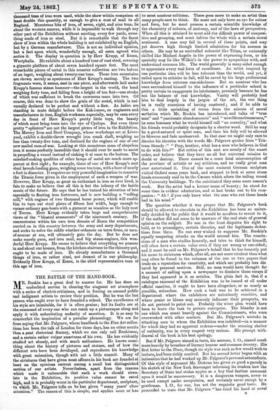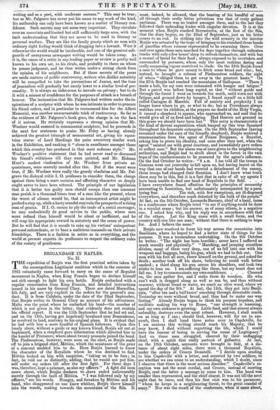THE BATTLE OF THE HAND-BOOK.
AIR. Ruskin has a great deal to answer for. He has done an undoubted service in clearing the stagnant art atmosphere with a series of electric criticisms, and in forcing an amazed public and indignant artists to review their position. But he was the last person who ought ever to have founded a school, The excellences of his style are ininaitahle, for it is often genius ; but its faults are at the command of every one who can catch up a picturesque slang and apply it with unhesitating audacity of assertion. It is so easy to counterfeit the inspiration of a peculiar phraseology. We are far from saying that Mr. Palgrave, whose handbook to the Fine Art collec- tions has been the talk of Loudon for three days, has no other merits than a pant rhetorical fluency, which we can only call Ruskinese, and a certain rather vulgar smartness of his own. He has evidently studied art closely, and with much enthusiasm. He knows some- thing about the history of pieture,s and statues, and of how the different arts have been developed, and reproduces his knowledge with great animation, though with not a little conceit. Many of the strictures that have given most offence in his book are founded at least on the opinions current among a small but distinguished section of our artists. Nevertheless, apart from the reasons which made it unbearable that such a work should circu- late in the Exhibition, its positive value cannot be rated high, and it is probably worst in the particular department, sculpture,. to which Mr. Palgrave tells us he has given "many years' close attention." The reason of this is simple, and applies more or less to most amateur criticism. There goes more to make an artist than many people care to think. He must not only have an eye for colour and form, but he must possess a certain scientific knowledge of the chemistry of colours, of anatomy, and of the laws of perspective. When all this is attained he must add the difficult power of composi- tion and grouping, and must inform the whole with a certain moral sentiment. A man may fail in several of these points, and may yet deserve high though limited admiration for his success in others. He may be an unrivalled colourist like Titian, or eminently skilled like Michael Angelo in the power of expressing form, or his specialty may lie like Wilkie's in the power to sympathize with, and understand common life. The world generally is many-sided enough to appreciate every real form of excellence. An artist inspired by one particular idea will be less tolerant than the world, and yet, if called upon to criticise in full, will be saved by his large professional knowledge from extreme one-sidedness. But an amateur who has once surrendered himself to the influence of a particular school la pretty certain to exaggerate its intolerance, precisely because he has not the balance of real knowledge. Vanity will probably lead
him to deal largely in the jargon of the art, the one thing he is really conscious of having mastered ; and if he adds to this a little sprinkling of terms from the science of moral aesthetics which Mr. Ruskin has introduced, and talks of "true men" and "passionate abandonments" and " uuselfconsciousnesses," he soon becomes what he would himself call "an unreality," and what his friends would probably designate by a shorter word. Still he may be a good-natured or quiet man, and then his folly will be allowed to blossom and fade unobserved. In that case we might only care to dismiss his theories with the words Mr. Palgrave quotes from "Tris- tram Shandy i" "Pray, brother, what has a man who believes in God to do with this ?" But critics of this sort are mostly of the smart order, and believe that they have an all but universal mission to doubt or destroy. There cannot be a more fatal misconception of the province of artistic or any criticism, and no really great man ever entertained it. One of the most eminent German sculptors visited Oxford some years back, and stopped to look at some stone heads commonly said to be the Caesars which adorn the railing round the University buildings. To the uninitiated they seem mere mason's work. But the artist had a keener sense of beauty; he stood for some time in evident admiration, and at last broke out to his coin- panion "Air! if you only knew what the man who ant those heads had in his mind."
The question whether it was proper that Mr. Palgrave's book should be allowed to circulate in the Exhibition has been so univer- sally decided by the public that it would be needless to revert to it, if the author did not seem to be unaware of the real state of general opinion on the subject. No one in the least disputes his right to hold, or to promulgate, certain theories, and the legitimate deduc- tions from them. No one ever wished to suppress Mr. Ruskin's equally unsparing attacks on the world around him. The conclu- sions of a man who studies honestly, and tries to think for himself, will often have a certain value even if they are wrong or one-sided; and it must be-said on Mr. Palgrave's behalf that he has honestly put his name to strictures which, after all, are not more virulent than what may often be found in the columns of the one or two papers that trade on a reputation for causticity, and which are probably less die tated by personal motives. Still, no man would have thought for a moment of calling upon a newspaper to disclaim these essays if they had appeared in it as articles. The plain fact is, that if a catalogue raisonne of the Exhibition was to be issued at all under official sanction, it ought to have been altogether, or as nearly as possible, colourless. How such a task was to be achieved in a department where the exhibitors are notoriously sensitive, and where praise or blame may seriously influence their prospects, we do not pretend to point out. Probably the wiser plan would have been to leave the task to private enterprise. The blunder is not one which can count heavily against the Commissioners, who were overworked with other matters. But Mr. Palgrave's mistake in attacking men to whom the Exhibition was indebted—in a manner for which they had no apparent redress—under the seeming shelter of authority, was in every respect very serious. His prompt with- drawal of the book is his best apology.
But if Mr. Palgrave sinned in taste, his accuser, I. 0., sinned much more heavily by breaches of literary honour and common decency. His first letter to the Times, though its style was such as few would wish to imitate, bad been richly merited. But his second letter began with an intimation that he had worked up Mr. Palgrave's personal antecedents. Of this style of argument Mr. Dickens has given so good a parody in his sketch of the New York Scavenger informing its readers how the Secretary of State had stolen apples as a boy that further comment upon it would be unnecessary. It is a dangerous weapon, never to be used except under compulsion, and certainly never except by a gentleman. I. O., for one, has not the requisite good taste. He proceeded to state that Mr. l'algrave "has tried his hand at novel
writing and as a poet, with moderate success." This may be true; but as Mr. Pa'grave has never put his name to any work of the kind, his authorship can only have been known as a matter of literary con- fidence. Such secrets may not seem very important. They circulate over an uncertain and limited but still sufficiently large area, with the tacit understanding that they are never to be used in literary or personal warfare. They are like the family gossip which no man with ordinary right feeling would think of dragging into a lawsuit. Were it otherwise the world would be intolerable, and one of the greatest safe- guards of anonymous newspaper writing would be taken away. As it is, the name of a critic in any leading paper or review is pretty well known to his own set, to his rivals, and probably to those on whom he passes judgment, and he thus writes under a strong check from the opinion of his neighbours. But if these secrets of the press are made matters of public controversy, writers who dislike notoriety will be compelled to take the precautions of Junius, and the tone of journalism will gradually but surely lower to a similar level of per- sonality. It is always an indecorum to intrude on privacy; but to do it with a misuse of confidence for the purposes of attack is a breach of honour. The insinuation that Mr. Palg,rave had written under the in- spirations of a sculptor with whom he was intimate in order to procure his friend orders, and in particular to recommend him for the Albert Memorial, was another unwarrantable trick of controversy. So far as the evidence of Mr. Palgrave's book goes, the charge is on the face of it untrue. He certainly expresses a strong opinion that Mr. Woolner would succeed in monumental sculpture, but he proceeds in the next few sentences to praise Mr. Foley as having already achieved the greatest triumph of monumental art, giving his eques- trian statue of Lord Hardinge the palm overevery similar work in the Exhibition, and ranking it "alone in excellence amongst those which this country has produced in that most arduous style." Mr. Woolner's positive statement that he had never read or discussed his friend's criticisms till they were printed, and Mr. Holman Hunt's modest vindication of Mr. Woolner from private ac- quaintance, were scarcely needed after this. But if the worst were true, if Mr. Woollier were really the greedy charlatan and Mr. Pal- grave the disloyal critic I. 0. professes to consider them, the charge against them being a mere surmise and affecting character so deeply ought never to have been uttered. The principle of our legislation that it is better ten guilty men should escape than one innocent man perish is a thousand times true of a case like the present, where the worst of silence would be, that an incompetent artist might be pushed a step up, while a hastyscandal mayruin the prospects of a rising man of genius. If I. 0. means to ply the trade of a social scavenger, he may undoubtedly do good service to the public, where men more refined than himself would be silent or inefficient, and he will reap his appropriate reward in notoriety and the sense of power. But he will find that it is unsafe to rake up his victims' unimportant personal antecedents, or to base a malicious innuendo on their private friendships. There is a fashion in satire as in everything, and the world at present expects its professors to respect the ordinary rules of the society of gentlemen.































 Previous page
Previous page